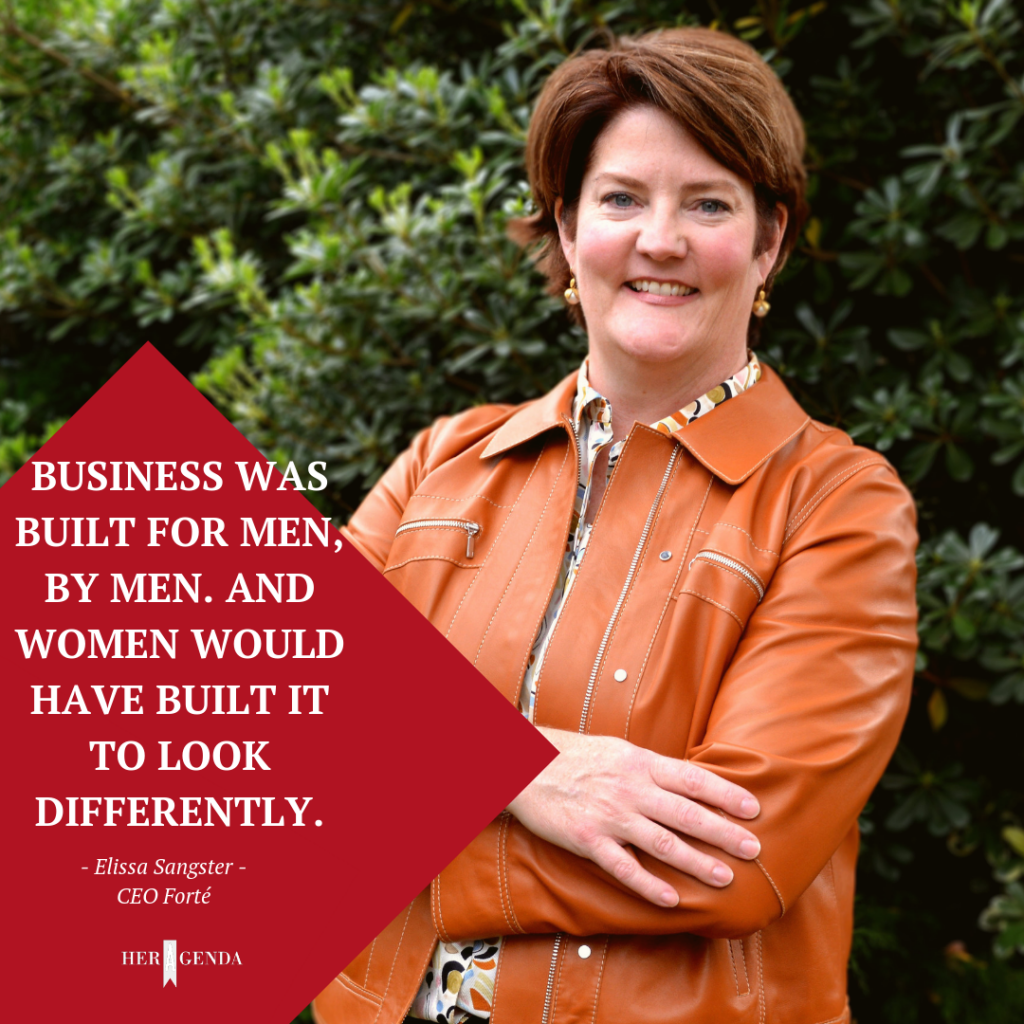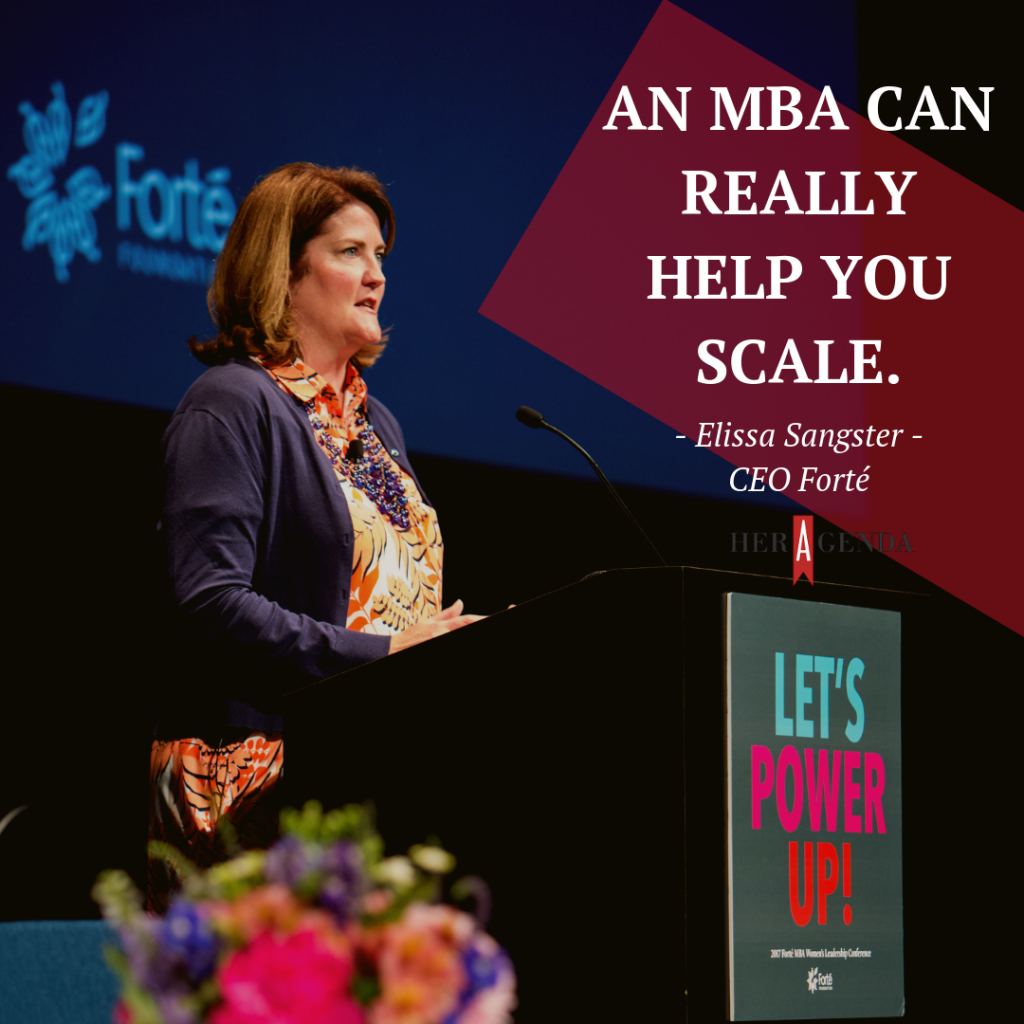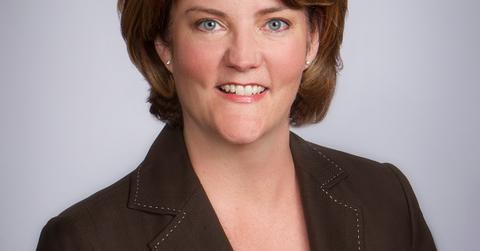Elissa Sangster is in the business of making more women leaders. Sangster leads Forté, a non-profit working to launch women into meaningful careers through access to business education, professional development, and a community of successful women.
She’s spent the last fifteen years building a robust pipeline of MBA talent for corporate boards, business schools, and companies—all areas in which women are underrepresented—and she has big plans for the organization’s future. Sangster earned her MBA from the Mays Business School at Texas A&M University. She knows firsthand the knowledge, value, and network that business school provides. While she admits that you do not need an MBA to be an entrepreneur, Sangster believes that the “built-in infrastructure” of the MBA (think a strong curriculum, access to top-tier professors and thought leaders, and a network of inspiring peers) provides a safe, supportive environment where women and first-generation students can thrive.
At the time Forté started, female enrollment in business schools was only 28 percent, lower than in schools of medicine and law. In 2018, Forté sponsor schools experienced an increase to 38 percent in women’s enrollment in full-time business school programs. One sponsor school achieved gender parity. Ultimately, as more women pursue MBAs, more opportunities arise in career advancement and leadership roles in the workforce.
Her Agenda caught up with Sangster to discuss her tenure with Forté and tips on reentering the workforce after a break.
Her Agenda: I’m sure you’ve seen a lot in the business education space. Do you feel business education/business school helps women get executive roles and get further in their careers?
Elissa Sangster: I do. What we see resulting from business school for women, in particular, is a huge increase in their confidence. It’s a transformative experience that you go through over those two years. We want women to be really clear about what they are bringing to the table and the MBA gives them that boost. We’ve just done some recent research looking at the salary increase overall for women. Once a woman earns an MBA, her salary can jump 63% from her pre-MBA job to her first job after business school. That’s a pretty significant bump over a two-year period for any person. The data was also showing an even greater increase for women of color, in terms of salary bump pre and post. It also narrows the pay gap between women of color and their white male counterparts.
-We want women to be really clear about what they are bringing to the table and the MBA gives them that boost.
Her Agenda: Describe Forté in four words as it stands now (versus where it was when you first started).
Elissa Sangster: The first word is community. Our first couple of years, we had a few thousand women throughout the United States, Canada, and Europe. It wasn’t a whole lot of women when you get right down to it. Now we have over 100,000 members. What does that mean in terms of the community? It’s a wide-reaching community, it’s a network that is powerful.
I would say another word is powerful. There is such power in the network we’ve built. The companies and schools represented. The types of women. The diversity of women that we have in our network. It’s a powerful group to be a part of. It’s an alliance between all of those companies and schools and the women. This makes us unique, I think. We have the ability to open doors for all of those different constituencies.
Opportunity. We have an amazing amount of opportunities for women, in terms of programs, corporate jobs, business school education, executive education. Again, it points to the community and network, but opportunities are just exponential compared to what they were back then.
And I would say significant because we are making a significant impact on women entering business school and on women advancing into business leadership. We’re seeing more and more women in our network. Business school enrollment rates for women have gone from 28 percent when we started to 38 percent this year. We’re seeing progress and that’s something we are really happy to be a part of.
-I see us building a full-fledged soup-to-nuts opportunity for a woman to enter into the Forté offerings their junior or senior year of high school, and then for us to really support and encourage women all the way through their journey.
Her Agenda: What other areas of interest do you have? Do you find that your work crosses over into your personal life as well?
Elissa Sangster: Well, I have a small child. She’s eight, so I have a lot invested in her as a young girl. One thing that’s kind of funny is that they had a wax museum project at her school. My daughter thinks I’m famous because I actually had an event where I got to take a picture with Katy Perry. She chose to be me as her school wax museum project. It’s very embarrassing when I’m next to Ruth Bader Ginsburg, Sacagawea, George Washington. So I guess that bled over into my personal life a little bit because she thinks I’m amazing because I do great things for women, ‘for women to have a better life,’ that how she describes it.
As the mom of a daughter, I think a lot about how I impact her vision of the future and what she can be. And even thinking about the little girls in her class and how I can talk to them about what’s important to think about even that early about your career path. And [getting them to begin to understand] what the inequities of the world are without completely depressing the eight-year-old population about the realities that are out there.

Her Agenda: What advice would you give to moms or women who are caretakers, who want to return to work after leaving for a period of time?
Elissa Sangster: For the women who are thinking about stepping away, make a plan about your re-entry. Make it now, before you leave. Think about the things you need to do in order to stay connected to your industry or field. Or know how you would on-ramp again once you are finished with child care, elder care, whatever is you stepped out for. It’s becoming more common with the millennial generation. You might not be stepping out for childcare—it might be a trip around the world for a year. The way you position that exit and the plan you make for re-entry are really critical. Think about how you’re going to keep your network fresh, how are you going to keep your skills fresh. If it’s a year, it’s probably not as problematic. If it’s going to be five to eight years or ten years, then it’s really important in that seven-year period to stay connected. It might be leadership and volunteer roles, but really think about how you are going to tell that story on the backend. It’s an important exercise to go through as you plan your exit.
-MBA’s see opportunity. They want to start something of their own. They want to be part of something big. Most MBA’s are looking to build significant, meaningful careers, and then trying to maximize opportunities across whatever industry it is they have expertise in.
Her Agenda: How about if you find yourself without a plan?
Elissa Sangster: For those who haven’t made a plan, and they are thinking about re-entering, I think it’s a little rocky. I think education is often a really good stepping stone back into a new role. If you don’t have an MBA already, it is a good way to jumpstart that career. If you do have an MBA, your network should still be strong as long as you’ve been kept in touch with them. It’s worth investing in a program like an Ivory launch program or returnship, there are a lot companies out there doing that. Getting some technology skills if you don’t have them is another easy way to re-enter the workforce.

Her Agenda: Are there different reasons for people applying to business school or being interested in business school now compared to the past? Have the reasons changed?
Elissa Sangster: I think it’s similar, especially for a full-time business school education. By and large, it’s because you’re ready to switch careers. When we ask students if you are going to enhance your career and go back to the same company when they graduate 98% actually change industries or functions. It very much is a career changer mentality in full-time. What shifts is really their reason.
MBA’s see opportunity. They want to start something of their own. They want to be part of something big. Most MBA’s are looking to build significant, meaningful careers, and then trying to maximize opportunities across whatever industry it is they have expertise in. And sometimes they are leaving because they have a bad job, sometimes not making a lot of money, sometimes because they lost a job. When the economy is bad, MBA program enrollment booms. By and large, you’re going to get access to opportunities and a skillset that you can leverage throughout your career.
Her Agenda: Do you think business school helps support people to start their own business or be better business people?
Elissa Sangster: If your ambition is to be a small business entrepreneur (like start a local restaurant chain or run a food truck or a car wash), I’m not sure you need to go back to get an MBA to be a good entrepreneur in that endeavor. If your goal is to grow your car washes across a state and region and make them into a national chain, that is a different story. That has a whole lot of strategies involved. It doesn’t mean an MBA would not be helpful in the first scenario, but it’s really helpful in the second scenario.
When you have to talk about financing, mergers and acquisitions, marketing on a national scale, employment practices across a nation or internationally, then being able to have that expertise, that network, those are important pieces of the MBA puzzle. Being an entrepreneur means a lot of different things to different people. If you want a scalable company, I think an MBA can really help you scale. And it makes you have access to a lot of people who you wouldn’t normally have access to because of the circle you now run in as an MBA. You have friends and colleagues you can connect with and get good advice from. Even MBA women from other schools feel a camaraderie to you, can be connectors and helpers to one another, even though they are not from the same school or in the same company.

Her Agenda: What are your goals and dreams for women going through the (business school) experience? And for Forté?
Elissa Sangster: My goal and dream for Forté as we go into the next ten years would be to connect the dots and really set some parameters where we need to first step in and intervene. I feel like we have a real message for that junior or senior in high school student, along with their parents, to really educate them on what that career path could look like and what business has to offer, no matter their college major. I see us building a full-fledged soup-to-nuts opportunity for a woman to enter into the Forté offerings their junior or senior year of high school, and then for us to really support and encourage women all the way through their journey.
Business was built for men, by men. And women would have built it to look differently. I’m not saying one is good or bad. But now women are in it, we need to be able to shape it and form it the way we would do it, or at least in partnership with men. We did not get that opportunity 100 years ago when people starting formalizing modern day business. Tear it down a little bit, in partnership with men, because again we don’t need to build business for women. We need women to refashion it. That’s what I hope Forté can offer for women.
[Editor’s note: This interview has been edited for length and clarity. This story is sponsored by Forté.]








